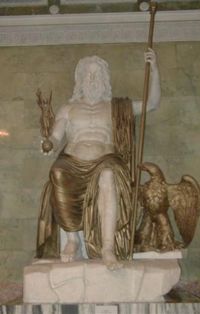Zeus
Zeus was the chief-god in the ancient Greek mythology. He was believed to be the one who liberated his brothers and sisters out of the stomach of his father, and was married with Hera. His domain was the sky, thunder and lightning. He was also called 'Father of humans and gods' and is famous for his escapades.
His early years
Zeus' father, Chronos, was told by an oracle one of his children would defeat him, like he had done with his father Uranos. Chronos, who was scared decided to eat his children right after they where born. And so he did. But Rhea - his wife - didn't like that very much. So when Zeus - the youngest son - was born, she decided to give Cronos some stones in a blanket, and he ate the stones instead of his son. She brought her son tho the isle of Creta, where he was educated by the nimph Amalthea on mount Ida. Once growned up, he forced his father to get his brothers and sisters out of his stomach, and so Chronos did. The titanic struggle followed. Afterwards, Zeus married his sister Hera and because he liberated his brothers and sisters, he was named chief-god.
Worship
Olympia in the south of Greece was the main focus for the worship of Zeus. While Mount Olympus was the home of the Greek gods, Olympia was linked specifically with Zeus (it was a effectively a second home) and so held special significance. There was ritual activity there from early in the first millenium B.C. In the fifth century B.C. a temple to Zeus was built at Olympia and it houses a monumental statue of the god. The Statue of Zeus was considered one of the Seven Wonders of the World and in time visitors came to Olympia as much to admire the temple and statue as to worship the king of the gods.[1]
- ↑ Price, Martin J. (1988). "The Statue of Zeus at Olympia", in Peter A. Clayton and Martin J. Price (eds.) The Seven Wonders of the Ancient World. Routledge. pp 60–62.
